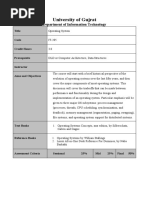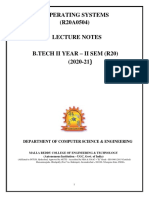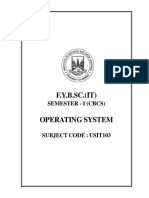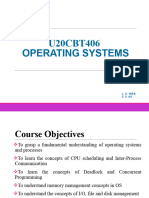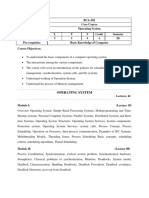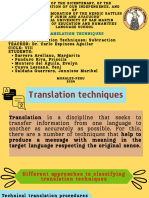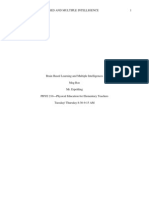603 Operating System
Uploaded by
VINUTHA G.R603 Operating System
Uploaded by
VINUTHA G.RCourse : 603 : Operating System
Course Code 603
Course Title Operating System
Credit 4
Teaching per Week 4 Hrs
Minimum weeks per Semester 15 (Including Class work, examination, preparation, holidays etc.)
Last Review / Revision June 2018
Purpose of Course Elaborate understanding of Middle Layer which manages hardware and application
software.
Course Objective To understand detailed working of OS
Pre-requisite Basic knowledge of Computer organization, data structures and computer
programming
Course Out come Students will be able to understand OS internals and learn basic shell scripting
Course Content Unit : 1: Operating System Concepts
1.1 Evolution of Operating System
1.2 Needs of an Operating System
1.3 Elements of an Operating System
1.4 Types of O.S.: Single User & Multi-User, Batch, Multi-
Programmed, Time-Sharing, Real-Time, Distributed, Parallel,
Mobile
1.5 Operating System Structure: Layered System, Microkernel and
Virtual Machine
1.6 Booting process of various Operating Systems
Unit : 2 : Process Management
2.1 Process concept
2.2 Process State Model
2.3 Process Scheduling
2.3.1 Scheduling Criteria
2.3.2 Scheduling algorithms
2.4 Thread and Multithreading
2.5 Inter-process Communication
2.6 Process Coordination
2.6.1 Critical Section problem
2.6.2 Semaphores
2.7 Deadlocks
2.7.1 Deadlock Characteristics
2.7.2 Deadlock Prevention, Avoidance
2.7.3 Deadlock Detection, Recovery
Unit : 3 : Memory Management
3.1 The notion of physical and logical address space
3.2 Contiguous allocation
3.3 Non-Contiguous allocation
3.3.1 Paging
3.3.2 Segmentation
3.4 Other Memory Management Schemes: Swapping and Overlays
3.5 Demand Paging & Demand Segmentation
3.6 Allocation of frames & Page Replacement policies
3.7 Implementation in various operating systems
Unit : 4 : File and Device Management
4.1 File Management
4.1.1 Device Characteristics
4.1.2 I/O Hardware
4.1.3 Application l/O Interface
4.1.4 Kernel I/O Subsystem
4.1.5 STREAMS
4.2 Mass Storage Structure
4.2.1Disk Structure
4.2.2Disk scheduling
4.2.3Disk Management
4.3 File Concept: File Types and File Operation
4.3.1 Directory Structure
4.3.2 Directory Implementation
4.3.3 File-System Implementation
4.3.4 Allocation Methods
4.3.5 Free-Space Management
4.3.6 File-System Mounting, File Sharing and Protection
4.3.7 Implementation in various operating systems
Unit : 5 : Introduction to Shell Scripting
5.1 User and system variables
5.2 I/O statements
5.3 Escaping, Quoting Redirection and Piping
5.4 Positional Parameters
5.5 Operators – arithmetic, relational, logical, file related, string
related
5.6 Conditional & Looping statements
5.7 Arrays
5.8 Functions
5.9 Grep, egrep and fgrep
Case Study: Windows, Linux and Mobile OS
Reference Book 1. Operating Systems Concepts - Galvin Silberschatz - McGraw Hill-9th Edition
2. Operating Systems - William Stallings – PHI- 9th Edition
3. Modern Operating Systems - Andrew S. Tanenbaum - Pearson Edu./PHI -4th
edition
4. Operating System, Dhamdhere, TMH-3rd Edition
5. Understanding Operating System, Ann McIver McHoes ,Ida Flynn, 5th Edition
6. Operating System, P Balakrishna Prasad, Scitech- 2nd Edition
7. Unix Shell Programming : Yashwant Kanetkar: 2003 Edition
8. Mastering Linux shell Scripting: Andrew Mallett:2015 edition Packt Publisher
Teaching Methodology Lectures, Discussion, Independent Study, Seminars and Assignment
Evaluation Method 30% Internal assessment, 70% External assessment
You might also like
- Cap560:Operating System: Course OutcomesNo ratings yetCap560:Operating System: Course Outcomes1 page
- Operating Digital Notes (R22 Regulation)No ratings yetOperating Digital Notes (R22 Regulation)156 pages
- Digital Notes Operating Systems (R20a0504)No ratings yetDigital Notes Operating Systems (R20a0504)161 pages
- Course Description: Nature of Course: Theoretical + PracticalNo ratings yetCourse Description: Nature of Course: Theoretical + Practical5 pages
- KCS 2202 COMPUTER OPERATING SYSTEMS COURSENo ratings yetKCS 2202 COMPUTER OPERATING SYSTEMS COURSE2 pages
- CCS 2124 2202 OPERATING SYSTEMS I COURSE OUTLINE JANUARY 2025 SENo ratings yetCCS 2124 2202 OPERATING SYSTEMS I COURSE OUTLINE JANUARY 2025 SE3 pages
- Feleke__Operating__System__Course__Plan_2025No ratings yetFeleke__Operating__System__Course__Plan_20254 pages
- CSI1002_OPERATING-SYSTEM-PRINCIPLES_ETH_1.0_57_CSI1002_59 ACPNo ratings yetCSI1002_OPERATING-SYSTEM-PRINCIPLES_ETH_1.0_57_CSI1002_59 ACP2 pages
- Mastering the Art of Linux Kernel Programming: Unraveling the Secrets of Expert-Level ProgrammingFrom EverandMastering the Art of Linux Kernel Programming: Unraveling the Secrets of Expert-Level ProgrammingNo ratings yet
- Yokouchi - 2023 - PRL - Giant Magnetochiral Anisotropy in Weyl Semimetal (WTe2) Induced by Diverging Berry CurvatureNo ratings yetYokouchi - 2023 - PRL - Giant Magnetochiral Anisotropy in Weyl Semimetal (WTe2) Induced by Diverging Berry Curvature6 pages
- Presentación Consejos para Emprender Llamativo AmarilloNo ratings yetPresentación Consejos para Emprender Llamativo Amarillo13 pages
- Brain Based Learning and Multiple Intelligences Final DraftNo ratings yetBrain Based Learning and Multiple Intelligences Final Draft7 pages
- Rahmani 30 Entrance Exam Analysis (2020 & 2025)No ratings yetRahmani 30 Entrance Exam Analysis (2020 & 2025)6 pages
- Critical Reading and Paraphrasing - CompressedNo ratings yetCritical Reading and Paraphrasing - Compressed85 pages
- Plutus Pioneer Program Readthedocs Io en LatestNo ratings yetPlutus Pioneer Program Readthedocs Io en Latest425 pages
- Simple Present and Present Continuous Formula and Exercise 19 Maret 2021No ratings yetSimple Present and Present Continuous Formula and Exercise 19 Maret 20217 pages
- Apex Code Developer's Guide - WiMarBuenoNo ratings yetApex Code Developer's Guide - WiMarBueno629 pages
- The Correct Methodology To Re-Establish The Islamic State (Urdu PDFNo ratings yetThe Correct Methodology To Re-Establish The Islamic State (Urdu PDF89 pages
- Micropython: Bme280 With Esp32 and Esp8266 - Measure Temperature, Humidity, and PressureNo ratings yetMicropython: Bme280 With Esp32 and Esp8266 - Measure Temperature, Humidity, and Pressure19 pages










